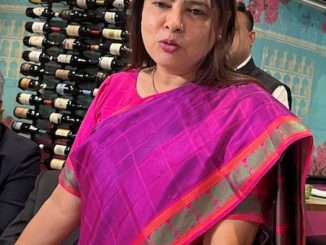Learning to live without a partner of 63 long years


On October 31, I lost my friend and companion of 63 years, my dear wife Melba. She was a gentle, unassuming woman with no craving for material things. She differentiated easily between right and wrong and ensured that her husband and two daughters followed the same path. She was endowed with good looks but that was something she never flaunted. Melba provided and guarded the moral compass that public servants belonging to the All India Services need to follow in their dealings with politicians and the public. Ours was an arranged marriage, as was the custom in those days. The husband of one of my mother’s sisters and cousin of Melba’s mother met and decided to broach the topic to her parents and my mother. The cultural background being the same, there was not much to decide except arranging a meeting of the boy and girl and obtaining their consent to the union.
I was stationed at Parbhani as SP and she was in Pune, teaching in a Convent school. I took three days’ leave and met Melba for the first time at the flat of her mother’s cousin. Descending the steps of the building, my mother asked me if I had liked the girl. When I answered in the affirmative, she said she had anticipated my reply. We were unofficially engaged. The official engagement was effected after a couple of months and marriage five months later, on April 25, 1959. I was a few days shy of 30 and she a month short of 21 when we tied the knot at Gloria Church at my mother’s parish in Byculla, Mumbai.
After the wedding, Melba came to Parbhani with me. It was a small district without electricity. Light was provided by a petromax. Socializing was confined to the district’s officials — the Collector and District Magistrate, District and Sessions Judge, Civil Surgeon, Executive Engineer and District Forest Officer. Among the local gentry there was just one couple we could relate to — a local Parsi businessman named Feroze Parakh and his Sindhi wife, Janki. They provided company to my new bride. Life in a non-descript district headquarters was different from that in a big city like Pune, as Melba quickly learnt.
The District Magistrate was Manu Dhavale, the son of a former ICS officer from the Bihar cadre. His wife, herself from a ‘service’ family, took Melba under her wing and introduced her to a life different to the carefree one she was accustomed to. Even before our first daughter was born in February 1960, I was transferred to the adjoining district of Nanded. There was more ‘life’ in Nanded and that pleased Melba, though she missed Nalini Dhavale, who was like an elder sister to her. The new district headquarters had electricity. It solved many problems, especially since our daughters were born during our over two years’ stay there.
There was a Parsi family whose household head was employed in the town’s Osmanshahi Mills. His son, Jamsheed Kanga, was an IAS officer of the 1956 seniority, posted at Parbhani soon after we left that district. His sister, a little older than Melba, stayed with her parents in Nanded. Melba soon developed a friendship with Ava, for that was her name. In the districts it is important to befriend one or two of the same sex to whom you can relate. Soon, Melba was kept occupied with our two babies. That in itself was enough to ensure that in an interior district she had always something to do. She was a voracious reader. In small districts like Parbhani and Nanded books were not easy to come by. In my next charge, Sholapur, accessing books was easier, and in Pune, where I was sent after Sholapur, Melba was at home, though her parents had shifted back to Goa just a couple of months before we arrived in the city.
The outpouring of grief at the news of her death was very real. Whoever had occasion to meet her, was impressed by her humility and sincerity. She had taught at various schools in Pune, Mumbai, Hyderabad and Delhi, where I was posted during the course of my service. There were numerous pupils and teachers who remembered her with love.
Since I was married to Melba for 63 years, I would be forgiven if I eulogized her qualities of mind and heart. Yet, I will deny myself that privilege. I will only mention what friends said or wrote, mainly wrote as words speak more loudly when put down on paper.
‘Melba leaves you with happy memories but with a hole in your heart,’ wrote one dear lady. She went on to say that it was not easy to lose one’s life companion. Stay with your activities and your pro bono work, she advised. ‘Her kindness and ready smile will remain in our memories,’ wrote another dear lady. This sentiment was a constant refrain in most letters I received. ‘I still turn to say something to Conrad only to realize he is no longer there,’ wrote a dear lady from New Zealand.
A retired IAS officer, who is presently chairman of an NGO with which I have been associated for the past two decades, mentioned to me that the Club of Elders, comprising mostly former IAS officers in Mumbai, had all remarked on Melba’s commitment to the values that they themselves valued and lived by. I can add my two-penny bit at this stage. She provided and guarded the moral compass that public servants belonging to the All India Services need to follow in their dealings with politicians and the public at large.
When I was growing up in Byculla, there was a girl next door on who I had a crush. She married a professor and settled in the US. Her husband died a few years ago. She wrote, ‘Having been through the loss of a lifelong companion myself, I know what you must be going through.’ So very true. It will take some time for me to adjust to a life without the woman I loved!
(The author is a retired IPS Officer, and a former governor)
THE INDIAN PANORAMA MOURNS THE SAD DEMISE OF MELBA REBEIRO, OFFERS HEARTFELT CONDOLENCES TO JULIO REBEIRO AND THE ENTIRE FAMILY AND THEIR FRIENDS, AND PRAYS FOR ETERNAL PEACE TO THE DEAR DEPARTED SOUL





Be the first to comment